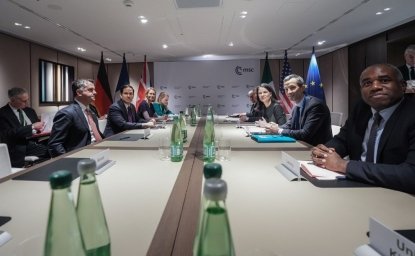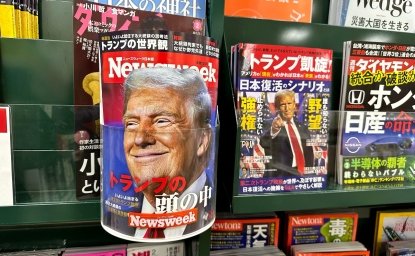President Barack Obama’s speech at the United Nations Wednesday offered to roll back the U.S. sanctions if Russia takes the “path of diplomacy and peace.” This overture comes on the heels of an emerging ceasefire between Russia and Ukraine and continuing discussions in Minsk to find a political solution to the turmoil in eastern Ukraine.
Obama’s U.N. speech, however, opens up the possibility of creating some daylight between the United States and the EU sanction programs. The European Union remains openly divided over the current sanctions — and far more economically bruised than the United States.
So even though Obama continues to talk tough on Ukraine, his offer of yet another “off ramp” runs the risk of being seized not just by Russian President Vladimir Putin but also by the EU.
What are the actual prospects for removing U.S. and EU sanctions? This question remains central to the international business community and to the broader resolution of the Ukrainian crisis.
The EU represents the weak link in the joint Western response to Russia’s action in Ukraine. It was only September 12 that the most recent round of sanctions was implemented in the wake of Russia’s “incursion” in southeastern Ukraine. The EU reluctantly agreed to these sanctions covering dual-use technologies, deepwater Arctic oil exploration and decreased access to Western financing. Several countries – including Slovakia, Hungary, Austria and the Czech Republic — expressed misgivings about this new round, especially since the ceasefire was just coming into place.
European Council President Herman Van Rompuy had also announced that the EU would review the sanctions program as early as the end of September if the peace plan in Ukraine was being implemented.
Now Obama’s speech has provided a justification for the EU’s repeated reviews of its sanctions program.
The obvious concern is that the EU unilaterally decides at some point to reduce its sanctions — which disproportionally hurt European economic interests — or whether reductions are coordinated between the EU and the United States. Any independent reduction of sanctions by the EU would leave U.S. business interests in Russia high and dry — and cause serious damage to EU-U.S. relations.
But what are the real chances that the EU — or the United States, for that matter — would change the current sanctions policy? Obama strongly condemned Russia’s actions in his U.N. speech and talked of imposing a “cost” on Russia’s aggression. More important, however, Obama now does not have the political clout to reduce the U.S. sanctions even if he wanted to.
Consider, Ukrainian President Petro Poroshenko’s speech before the U.S. Congress was greeted with the sustained cheers reminiscent of previous speeches by visiting Eastern European leaders, such as Vaclav Havel and Poland’s Lech Walesa, the Solidarity leader. Senators Robert Menendez (D-N.J.) and Bob Corker (R-Tenn.), respectively the chairman and ranking member of the Senate Foreign Relations Committee, also recently introduced the Ukraine Freedom Support Act of 2014, which calls for increased sanctions against Russian companies, including Gazprom, the energy provider.
In addition, support for Ukraine is one of the few issues that unite Republicans and Democrats in Congress, and they are unlikely to back any olive branch to Russia.
The EU would also face various internal hurdles if it decided to change its sanctions program. The European Parliament recently called for increased sanctions against Russia, including its possible exclusion from the SWIFT international electronic payment system. Such an action would essentially cut Russia from the global banking system — a step many European leaders have viewed as too provocative now to consider.
But the EU faces an even more daunting challenge. As part of the recent peace negotiations, the EU agreed to delay the implementation of part of the association agreement with Ukraine until December 31, 2015. In particular, Russia objects to Ukraine’s simultaneous membership in two free trade zones — since EU goods could potentially enter Ukraine duty free and then be reshipped to Russia, avoiding Russian tariffs on European goods.
Russia’s trade concerns are legitimate. Prime Minister Dmitri Medvedev has now signed new customs duties that would take effect if the EU association agreement is fully implemented.
At the same time, the main leverage that the EU retains in these impending negotiations is the existing sanctions program. So any sudden reduction of EU sanctions would play directly into Putin’s hand and potentially kill the association agreement — the underlying cause of this whole crisis in the first place.
In addition, it still remains unlikely that Obama or the EU would move swiftly to remove the sanctions in light of the many security concerns raised by Russia’s actions in Crimea and eastern Ukraine. The North Atlantic Treaty Organization secretary general, for example, recently labeled Russia (along with the Islamic State) the greatest threat to peace in the world. Moscow continues to issue threats to the Baltic states and NATO and is rapidly increasing its military spending.
So the ceasefire in eastern Ukraine is unlikely to be enough to convince Obama that Russia has sufficiently changed course to ease sanctions.
The dirty secret is that sanctions are having an impact on Russia. The Russian economy confronts years of stagnation at best and an immediate recession at worst. Russian banks are being squeezed out of international markets. Exxon is winding down its Arctic exploration project and more Russian companies — public and private — are coming to Moscow, cup in hand, seeking bailouts. Sanctions also threaten to put a major dent in Russia’s hard currency reserves — Moscow’s primary economic safety net.
But a sanction program can only work over the medium- and long-term. Sanctions do not, as has been re-affirmed by Russia, have the capability to change short-term geo-strategic calculations.
Putin’s best chance at removing the sanctions is to pursue a divide and conquer strategy, sowing divisions within the EU and between the EU and the United States. A united front has been maintained so far — and both the EU and the United States have plenty of reasons to keep the pressure on Russia.
But Obama’s U.N. speech does represent a potential crack in this unity. For he again hinted about a diplomatic solution that may be more acceptable to the EU than Washington.
Obama needs to lay out in precise terms the conditions that could lead Washington to consider a change in its Russian sanctions policy. Otherwise, the EU may use Obama’s U.N. speech as an opportunity to reconsider its current sanctions — to the clear detriment of U.S. business and national security interests.
The opinions expressed here are those of the author.
This article was orignally published on Reuters.com.





